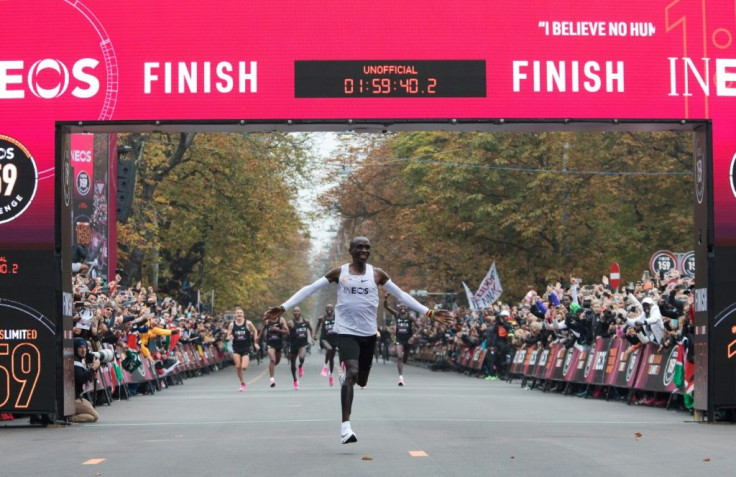Tokyo Olympics: Nike Vaporfly Allowed For Track Events By World Athletics

KEY POINTS
- Nike Vaporfly will be allowed at the Tokyo Olympics but prototypes of new versions will be banned
- World Athletics adopted new rules governing sole thickness and other aspects of construction
- Opponents call the use of high-tech shoes cheating
World Athletics, the governing body for track and field events, announced it would allow Nike’s high-tech Vaporfly shoe to be used at the Tokyo Olympics but banned any shoe not openly available to all athletes.
“It is not our job to regulate the entire sports shoe market but it is our duty to preserve the integrity of elite competition by ensuring that the shoes worn by elite athletes in competition do not offer any unfair assistance or advantage,” World Athletics President Sebastian Coe said in a press release.
The $250 Vaporfly, which comes in neon shades and weighs less than a half-pound, has become a favorite among marathon runners for its cushiony soles and carbon-fibre shanks. Critics of the shoes say it gives wearers an unfair advantage.
The New York Times reported its analysis indicated the shoes improve performance by 4%, confirming Nike’s claims. In little more than a year, the five fastest ever marathon times have been recorded.
The Vaporfly, first introduced in 2016, gained attention in October after two Kenyan runners broke records while wearing the shoes: Eliud Kipchoge broke the two-hour barrier in Vienna wearing an AlphaFly prototype of the shoe, and Brigid Kosgei eclipsed women’s world record by 81 seconds in Chicago wearing the latest version of the shoe. The AlphaFly would be banned under the new rules.
World Athletics said there’s insufficient evidence to justify banning the shoe. It listed requirements for shoes, rejecting those with soles thicker than 40 millimeters, or those with rigid plates or blades, and ordered further research “to establish the true impact of this technology.” Previous rules stated shoes must not provide an unfair advantage.
“The Assistance Review Group has concluded that there is independent research that indicates that the new technology incorporated in the soles of road and spiked shoes may provide a performance advantage and there is sufficient evidence to raise concerns that the integrity of the sport might be threatened by the recent developments in shoe technology,” the organization said.
Asics America professional track athlete Sara Hall hailed the World Athletics action, thanking the organization for creating clearly defined rules.
“Athletes have lost out medals, funding and financial support because Nike has been allowed to break the rules while World Athletics slept and done nothing,” Matt Yates, a former Olympian and now a top coach, told the Guardian. “It’s the same as doping, it’s simply cheating.”
© Copyright IBTimes 2025. All rights reserved.






















